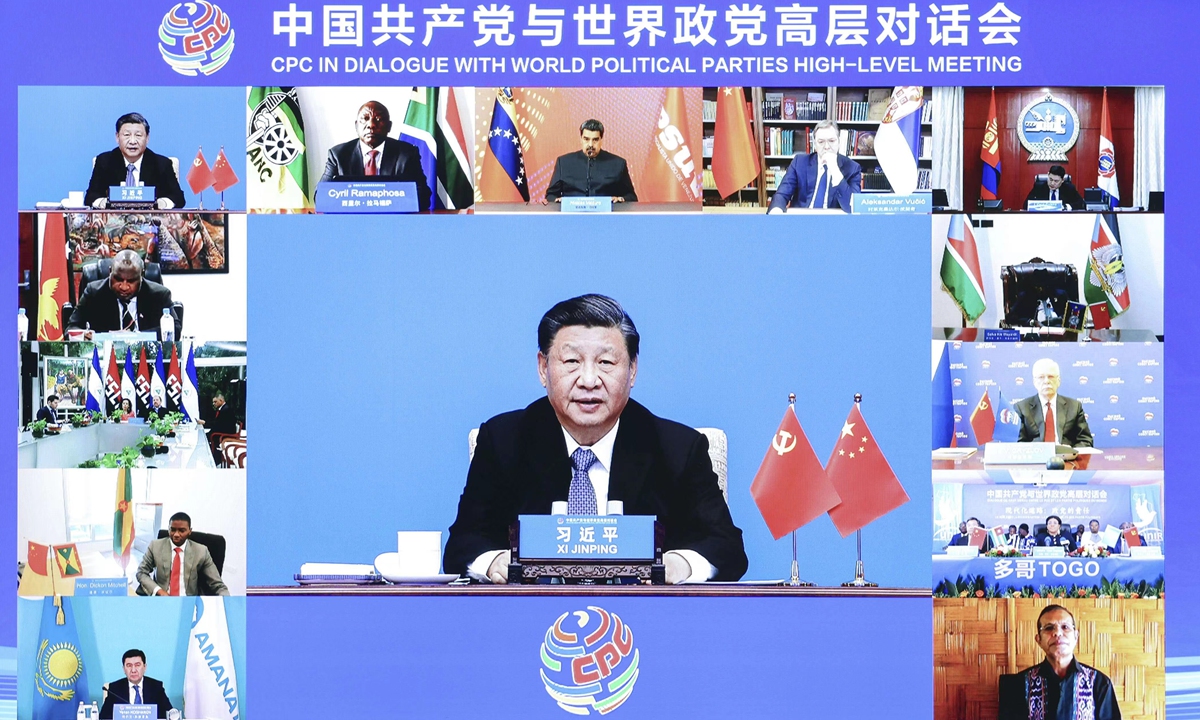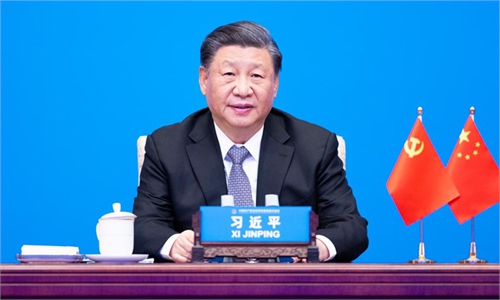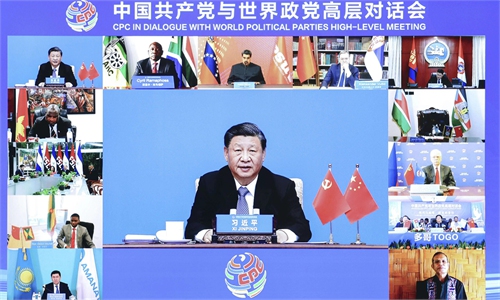Global Civilization Initiative – another gift from China to world: Global Times editorial

Xi Jinping, general secretary of the Communist Party of China (CPC) Central Committee and Chinese president, attends the CPC in Dialogue with World Political Parties High-Level Meeting via video link and delivers a keynote address in Beijing, capital of China, on March 15, 2023. Photo: Xinhua
Xi Jinping, general secretary of the Communist Party of China (CPC) Central Committee and Chinese president, proposed the Global Civilization Initiative when he delivered a keynote speech at the opening ceremony of the CPC in Dialogue with World Political Parties High-Level Meeting on Wednesday. This is the third major global initiative presented by China after the Global Development Initiative and the Global Security Initiative. It fundamentally answers a series of questions of the times, such as "What kind of modernization do we need?" and "How can we achieve modernization?" The initiative has become another important public good provided to the world.The background of the Global Civilization Initiative is that in recent years, as geopolitical conflicts have intensified, the "clash of civilizations" and "superiority of civilizations" have returned to public attention under the instigation and hype of some politicians in the US and the West. The hatred and estrangement among different civilizations have seriously hindered international cooperation. At the same time, "black swan" and "grey rhino" incidents are occurring frequently in the international community, and multiple challenges and crises are intertwined and superimposed. Different countries and civilizations urgently need to work together to deal with global challenges that affect the future and destiny of mankind as a whole. The Global Civilization Initiative can be said to have emerged in response to the demand of the times, and has strong practical significance and practical value.
The Global Civilization Initiative puts forward four initiatives - respect for diversity of civilizations, advocating the common values of humanity, highly valuing the inheritance and innovation of civilizations, and jointly advocating robust international people-to-people exchanges and cooperation. It covers the basic concepts and principles that different civilizations can tolerate each other and coexist, and has the source of motivation and a practical path for realization. It is a major initiative that is very constructive, operable and sustainable. Since it advocates respect for different civilizations and support for their development rights, it fully meets the strong needs of the international community and has shown strong vitality from the very beginning, arousing enthusiastic responses in the international community.
As abovementioned, after the end of the Cold War, the world entered an era of high globalization, but it has not really experienced peace. The Cold War mentality and practice of demarcating ideological boundaries and engaging in camp confrontation have not disappeared. On the contrary, in recent years it is resurging. The Russia-Ukraine conflict is essentially a remnant of the Cold War detonating a powder keg in the 21st century. In other parts of the world, the practice of distinguishing between friends and foes in the name of "values" and wooing one faction while fighting against another faction casts a huge shadow on world peace and development.
Furthermore, without true equality and inclusion among civilizations, the process of peace and development will always be at risk of being interrupted. There have been too many tragedies in this regard, both historical and current. In this sense, the Global Civilization Initiative is an extension and complement to the Global Development Initiative and the Global Security Initiative, and together they form the key components of a human community with a shared future.
The world does not need hatred, division or conflict, and the people of all countries want to live a good life. Since the founding of the People's Republic of China, the Communist Party of China has led the Chinese people to create two miracles - rapid economic development and long-term social stability. These are by no means "out of luck." Instead, they have their own profound internal logic. The Global Civilization Initiative, Global Development Initiative and Global Security Initiative are highly condensed versions of China's past successful experiences, which China is willing to share with the world without reservation to achieve common development through mutual exchange and learning. It can be said that these three initiatives are all high-quality global public goods demonstrating China's sincerity and goodwill.
It should be emphasized that China is not only a "thinker" but also a "doer" in promoting building a human community with a shared future. In the past year or so, the number of countries and international organizations supporting the Global Development Initiative has increased to more than 100; the Group of Friends of the GDI established on the UN platform has expanded to more than 60 members; and platforms such as the Global Development and South-South Cooperation Trust Fund, the Global Development Promotion Center, and the China Global Development Knowledge Network have also been established one after another. Just a few days ago, Saudi Arabia and Iran held a dialogue and reached an agreement in Beijing, which also became a successful practice of the Global Security Initiative. This happened less than a year after the initiative was first proposed.
Thus, there are more reasons to expect that the Global Civilization Initiative, together with the Global Development Initiative and the Global Security Initiative, will constantly inject stability and bring new hope to this world of turbulence and transformation. At the same time, we also believe that "Chinese modernization, as a new form of human advancement, will draw upon the merits of other civilizations and make the garden of world civilizations more vibrant."


